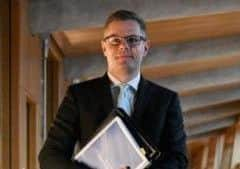Scottish Budget set to pass after SNP and Greens deal
The budget was branded a “triple tax whammy” by opposition parties last night, while business leaders warned it would erode the trust of industry. The deal with the Greens, which was confirmed less than an hour before finance secretary Derek Mackay addressed MSPs, also saw the SNP break a manifesto pledge to cap council tax rises at 3 per cent.
The agreement meant the £34 billion Scottish budget was passed at stage one.
Advertisement
Hide AdAdvertisement
Hide AdMr Mackay said: “These additional measures will deliver the most significant empowerment of local authorities since devolution and provide additional funding to support local services.


“This enhanced package offers up to £187 million of increased funding and flexibility to councils, on top of the £11.1bn local government settlement. In total, overall spending power for local authorities next year will be £620m higher than it is currently.”
The deal will mean £90m of additional cash for councils and the ability to raise £97m more amid concerns over cuts in Mr Mackay’s original plans.
The relaxation of the 3 per cent cap on council tax rises is a breach of a manifesto pledge by the SNP to cap the rate at this level. It means bills can rise by a maximum of 4.79 per cent. In Edinburgh, this will mean the average band C property goes up by £52, while band G properties rise by £116.
Councils will also be handed powers to introduce a new workplace parking levy, although this will not include hospitals and other NHS properties. Although the costs remain unclear, a similar scheme in Nottingham costs firms £415 a year if they have 11 spaces or more. It is up to the firms whether or not they pass the charge onto staff.
As well as the plastic bag charge increase, ministers have also agreed “in principle” to a charging regime for disposable coffee cups.
The tourist tax was immediately welcomed by Edinburgh Council leader Adam McVey, who immediately indicated the levy would be introduced in the capital.
“I’ll keep speaking to industry to make sure we get this policy right,” he said.
Advertisement
Hide AdAdvertisement
Hide AdCouncillors in Edinburgh will discuss the plans again next week. They have suggested a surcharge of £2 on hotel rooms, which could raise £14.6m a year.
The Scottish Tourism Alliance said the tax would “deliver a significant blow to our industry”. The body said: “It will only serve to undermine the confidence that the thousands of tourism businesses operating across all sectors of the industry has had in the Scottish Government.”
Andrew McRae, the Federation of Small Business’ (FSB) policy chair in Scotland, slammed yesterday’s deal.
“We’ve seen concessions from the Cabinet secretary for finance that will erode the small business community’s trust in his administration,” he said. “Instead of Brexit help for firms, we see more tax changes, including a levy on our vital tourism industry. Ministers repeatedly promised firms that they would not pave the way for tourism taxes without industry support. They’re breaking that promise.”
Town halls will also be handed control over rates relief on empty commercial properties, which would be another avenue to generate extra funds.
Ministers have also pledged to set out three-year funding deals for local authorities in future so they are not left in the dark from year to year as they seek to plan spending.
Gail Macgregor, resources spokeswomen with local government body Cosla, said the measures set out by the government were welcome recognition of the “essential services” councils deliver.
“This helps councils across the country in making their tough choices,” she said.
Advertisement
Hide AdAdvertisement
Hide Ad“Meaningful progress has been made on a number of fronts, including a commitment to secure more sustainable funding for local government going forward.”
Councils had originally complained the budget plans set out by Mr Mackay in December would have meant £254m of cuts to their “core budgets”.
Tory finance spokesman Murdo Fraser said the deal left Scots facing a “triple tax bombshell”.
He said: “We will pay the highest income taxes in the UK, council tax will go up and now you might even be taxed hundreds of pounds a year for taking your car to work.”
The SNP minority government needed the support of at least one other party to get its spending plans through. Labour had pledged to vote against the plans over the extent of the cuts to local councils, while the Tories and Liberal Democrats were both demanding a second referendum be taken off the table.
It meant the Greens, who have combined with the SNP for the past two years to back the budget, were again Mr Mackay’s only serious hope of a deal. Two days of negotiations had failed to resolve the impasse, but an agreement was finally reached at the 11th hour.
